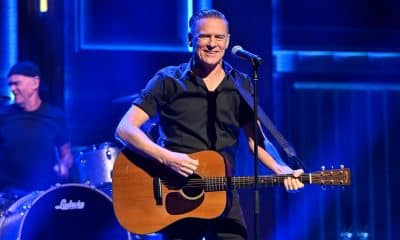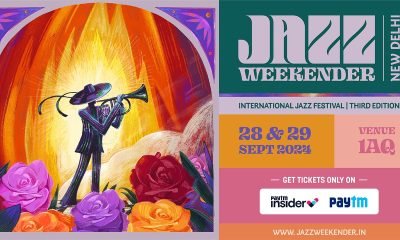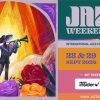News
Chasing Tunes, Making Jazz
A chat with legendary jazzman Carlton Kitto about bebop jazz, music festivals in Goa and the lost Christmas of Park Street, Kolkata.
[newsheader]

Carlton Kitto Live at Arts Escape Festival Goa. Image by WhatsTheScene
Chasing Tunes, Making Jazz
By Payel Majumdar
A chat with legendary jazzman Carlton Kitto about bebop jazz, music festivals in Goa and the lost Christmas of Park Street, Kolkata.
“Last night at Moulin Rouge I met a guy from Thailand at a gig, who freaked out on my guitar play. He came to me and said, I’m a jazz fan. I listen to all jazz musicians. Your music is absolutely undisputed bebop jazz. You don’t get this in Thailand.” Carlton Kitto, veteran jazz personality in the best sense of the word, has been an undisputed attraction of the jazz mise-en-scene of Kolkata for the past three decades. Musician, teacher and mentor to a whole generation of jazz musicians, Carlton is a stubborn man. The crests and troughs of the popularity of jazz in the glitzy clubs of Kolkata flowed past him as the years did, while he stood up for the music he loved.
Carlton traces his jazz roots to his childhood, specifically to his mother’s love for jazz, “My mother had a gramophone record – a winding gramophone record. And on it she had all these jazz artists – Bill Cosby, Frank Sinatra, Benny Goodman, Artie Shaw, Johnny Darcy, Wellington – people like that. I would listen to them and at the age of ten, I was playing the guitar.” As a result of meetings about jazz organised by his mother, Carlton picked up how to play the guitar and learning how to scat by the time he was ten. He remembers getting his first award around then, something which spurred him on.
It was then that Carlton discovered Charlie Christian, the founder of bebop, something which would leave an impact on the direction his life would take. He recalls that moment in his life when he heard a Charlie Christian record for the first time, “He created bebop jazz. He died at the age of 22. He was a genius. So when I went and got a guitar, I went looking for many places where I could get a record of Charlie Christian. I learnt all his singles by heart on the guitar”.

“The Calcutta crowd was totally different back then. Everyone would listen to hardcore jazz.”
Carlton later went onto emulate Charlie Parker, Gillespie and others into his guitar play. Hear him now, and you’re transported by his impeccable guitar work and instinct to that era instantly. He recalls how things were way more difficult back then, with access needed to a record player to get to hear new music – “now it has become so easy, you can listen to whoever’s music you like on the internet!” Albums containing jazz anthems like Anthropology, Ornithology were his forte by the time he started out as a band member in Kolkata, part of the Jazz Ensemble, the same place where Louis Banks played.
He draws for us a picture of the night scene in the swing era which he misses, “The Calcutta crowd was totally different back then. No disco and khisko. Everyone would listen to hardcore jazz. The people playing had standards. Yes, nightclubs were all filled with genuine artists who could read and play real music back then with orchestration.”
Carlton is less fond of the night scene now, he sees the influx of Bangla jazz and funk jazz to be motivated towards a crowd which just wants to dance. “You add some funk and people will dance to it. With regular jazz you can always do some ballroom dancing. For instance, you can dance to Frank Sinatra’s tunes like ‘New York, New York’. Early on, we used to do ballroom dancing. People would come dressed; you had to wear a suit and a tie before getting on the floor. This was true for the musicians as well.” (We can only imagine an 80s Kolkata, the clicking heels to polished patent leathers doing the rounds of the dimly lit Moulin Rouge and it makes us wistful.)
Having gone to Goa recently he likes the vibe Goa has going on around jazz music. Musicians are in every nook and corner, in Bombay as well as Goa, composing or doing things around that. According to Carlton, Goans pick up the voice quality or stance required for jazz for there is a culture of training the young to pick up a musical instrument. He appreciates how all of them are into music, and the fact that the community has audiences appreciative of different types of music. “I played at the Arts Escape Festival and the music was arranged absolutely by me. And then Ishita who sings with me, went up on the stage, and we did a one-on-one. My guitar functioned as a whole orchestra backing her, and she was at liberty to scat and what you call ‘chasing a tune’ and this is a part of the vibe, which we do at every concert. The crowd was very enthusiastic. We were playing with jazz icons from around the world.”

Ishita and Carlton performing together at the Jazz Utsav, Kolkata
As far as jazz/Indian Classical fusion projects go Carlton says, “Both are improvisational music, but jazz is much richer in the form that it has a harmonic concept. Indian classical is based on a rhythmic concept. It has a raga, but there is no harmony or chords provided. That is where the confusion erupts. Because they are taking a raga, and putting chords, putting a piano, and mixing the two. Where both sides are getting corrupted. That is fusion for you.” He remembers talking about the same thing with Ravi Shankar, “I was playing with Ravi Shankar at Blue Frog and he wanted to play along with his daughter so he jammed with us. And I had my group at that time, so he told us to play the minor chords and there started the confusion; and I told him afterwards, you could’ve done it much better, had you done it with the tabla. He started laughing and said I play this music in America.”
Carlton is wistful while recalling Christmases in the past and the performances which were lined up during the festive season in the heydays of jazz in Calcutta. There were Christmas galas, New Year galas, band performances, cabarets, and magic shows he remembers that would deck up the season. Now, it is more about quiet get-togethers in a shrinking-by-the-day community of Anglo Indians. For Carlton, nothing captured his spirit better, the sub culture of jazz and the love of a live performance, to which he dedicated his life as an independent musician.
[newsfooter]







































